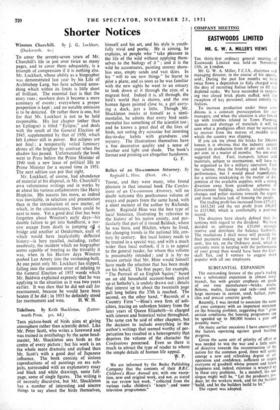Shorter Notices
Winston Churchill. By J. G. Lockhart. (Duckworth. 6s.) To cover the seventy-seven years of Mr. Churchill's life in just over twice as many pages, and to cover them adequately, is a triumph of compression if it is nothing else. Mr. Lockhart, whose ability as a biographer was demonstrated last year by his Life of Archbishop Lang, has here achieved some- thing which within its limits is little short of brilliant. The essential fact is that the story runs ; nowhere does it become a mere summary of events ; everywhere a proper proportion is kept ; and no notable omission is to be detected. Or rather there is one, but for that Mr. Lockhart is not to be held responsible. His last chapter (other than an Epilogue) is titled " Eclipse," and deals with the result of the General Election of 1945, supplemented by that of 1950, which left Labour still in power. But eclipses are not final ; a temporarily veiled luminary shines all the brighter by contrast when the shadow has passed. Unfortunately the book went to Press before the Prime Minister of 1940 took a new lease of political life as Prime Minister for a second time in 1951. The next edition can put that right.
Mr. Lockhart, of course, had abundance of material at his disposal, in Mr. Churchill's own voluminous writings and in works by or about his various collaborators like Harry Hopkins. His success lies more, as indeed was inevitable, in selection and presentation than in the introduction of new matter, of which, in the circumstances, there could be next to none. Yet a good deal that has been forgotten about Winston's early days—his double failure to get into Sandhurst, a nar- row escape from death in jumping o a bridge and another at Omdurman, each of which would have incalculably deflected history—is here recalled, including, rather needlessly, the incident which no biographer seems capable of treating as the triviality it was, when in his Harrow days Winston pushed Leo Amery into the swimming-bath. At one point only Mr. Lockhart has slipped, falling into the common error of relating to the General Election of 1935 words which Mr. Baldwin explained expressly that he was applying to the situation as it was two years earlier. It was then that he did not.call for rearmament, because he would have been beaten if he did ; in 1935 he definitely stood for rearmament and won. H. W. H.


































 Previous page
Previous page